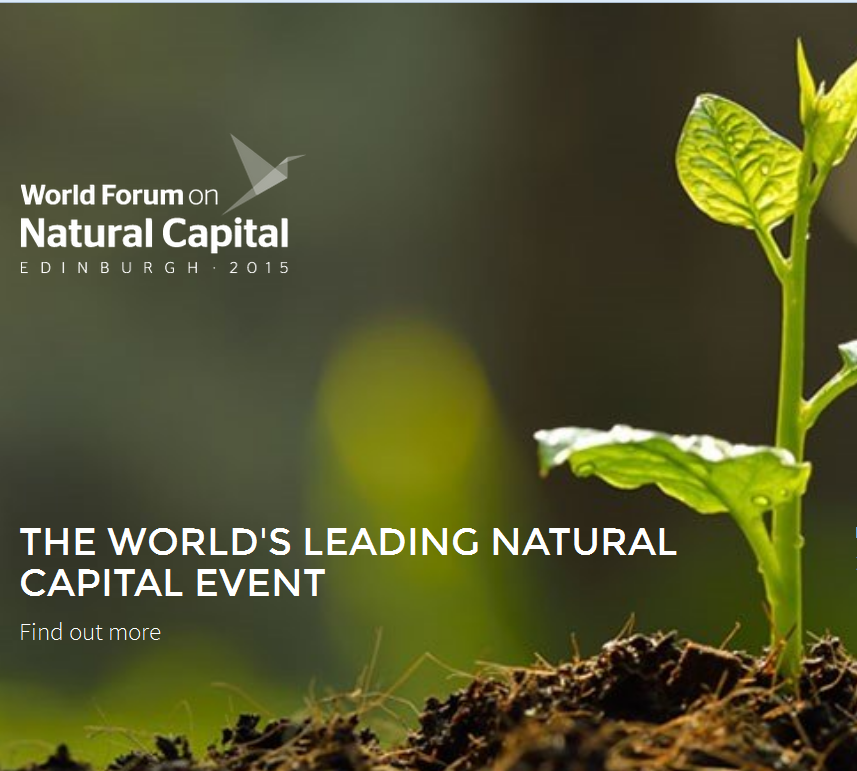 With the currently ongoing World Forum on Natural Capital in Edinburgh we have reached another peak in the discussion about the value of nature — natural capital is all around us. As there are so many news on this, I decided to group them together into one post, so you can check all of the newest links to natural capital I have found today.
With the currently ongoing World Forum on Natural Capital in Edinburgh we have reached another peak in the discussion about the value of nature — natural capital is all around us. As there are so many news on this, I decided to group them together into one post, so you can check all of the newest links to natural capital I have found today.
World Forum on Natural Capital
First of all there’s obviously the World Forum on Natural Capital itself which is co-hosted by several large nature conservation NGOs and an impressive line-up of speakers (see the programme here).
Natural Capital debate: Helm rebutts Monbiot, misses target
In this article on his blog Miles King refers to the debate between George Monbiot and Tony Juniper at the opening of the Forum on Natural Capital and, more precisely, the response by Dieter Helm, chairman of the Natural Capital Committee to the concerns expressed once more by Monbiot:
“This morning Prof Dieter Helm, Patron Saint of Natural Capitalists, posted a rather tetchy piece in the Guardian sustainable business section, huffing and puffing about why Monbiot is wrong and Natural Capital is the only way to “save” nature, or at least protect the renewable natural resources that humans depend on, in the language of economics.”
More tales from Natural Capital Wonderland: Woodlands and Badgers
In another article on his blog Miles King points to a report written by Andrew Lilico for Woodland Trust to quantify the economic value of woodlands in the UK:
“Lilico looks at the monetary value of woodlands as a policy tool – and comes up with the main benefit being to “facilitate housing development”. Now given the Woodland Trust’s campaign to save ancient woodlands from threats such as err housing development, this is econometric gymnastics. Just as well he only valued ancient woodland biodiversity value a third higher than newly planted woodland.”
Consultation on Draft Natural Capital Protocol launched
The Natural Capital Coalition has launched its Draft Natural Capital Protocol and sector guides for public consultation:
Today offers the opportunity to see for the first time the draft Natural Capital Protocol and Sector Guides as they are launched for consultation at the World Forum on Natural Capital. The draft Protocol and Sector Guides have been developed by the Natural Capital Coalition as a standardized framework for business to measure and value its impacts and dependencies on natural capital and to help them integrate this into their decision making.
The Natural Capital Coalition is built upon the belief that through collaboration we will go further.
The consultation is therefore an essential part of the development process. As well as engaging with the growing Coalition membership, which has doubled in the last six months and now stands at 168 organisations, the Coalition is establishing an expert review panel, to lead the consultation, build consensus and gain market momentum. The consultation compliments the existing business pilot program that is already underway and includes over 50 companies representing all geographies and many major sectors.
The consultation will run until the 26 February 2016 and will be followed by several months of further development prior to the launch of Version 1 in July 2016.
You can access the consultation website and see also the related article by Mercados de Medioambiente: Participa en la consulta sobre el Protocolo del Capital Natural lanzada por la Natural Capital Coalition
Natural Capital Impacts in Agriculture: Supporting Better Business Best Decision-Making
Mercados de Medioambiente have also publishes another article on the impacts of natural capital in agriculture: Los impactos del capital natural en la agricultura(in Spanish)
“La Organización de las Naciones Unidas para la Agricultura y la Alimentación (FAO) ha editado un informe que advierte que existe una desconexión alarmante en muchos países entre el precio al por menor de los alimentos y su verdadero coste de producción. Esto conduce a que los alimentos producidos con un elevado coste medioambiental en forma de emisiones de gases de efecto invernadero (GEI), contaminación del agua y del aire y destrucción de hábitats puede parecer más barata que otras alternativas que apuestan por producirlos de manera sostenible.”
Coca-Cola, Apple, Dow see fertile ground for investing in natural capital
“As a first step for unconvinced corporate decision-makers, the business relevance of investing in nature-based solutions can be ascertained through simple questions:
- In the short-term, is there a nature-based solution to a problem that we are facing that offers savings and simplicity?
- And looking forward, do we know whether our corporate facilities and key supply chain partners face green infrastructure-related (or nature-related) risks that could render them inoperable for a time? Could we mitigate ecosystem malfunction risk through investing in nature?”
